- Home
- Technical Cooperation Projects
- Index of Countries
- Asia
- Laos
- The Project on Riverbank Protection Works Phase II
- Project News
- Counterpart Training Course in Japan (First Batch)
Project News
2011-08-02
Counterpart Training Course in Japan (First Batch)
Five (5) trainees selected for the first batch of counterpart training course on "Riverbank Protection Works Phase II" left Lao P.D.R. on July 17, 2011 and stayed in Japan until August 2, 2011.
Technical Cooperation Projects, which optimally combine the "Dispatch of Experts", "Acceptance of Training Participants" and/or "Provision of Equipment", are the core operations of JICA's Technical Cooperation. Regarding the acceptance of training participants for this Project, training course will be held in Japan three (3) times during the project period (approximately four (4) years).
The objectives of Counterpart Training Course on "Riverbank Protection Works Phase II" are as follows;
- To learn and enrich their understanding of current river management including riverbank protection measures carried out by Japanese Government and local communities through site visits, which will allow participants to acquire basic skills to undertake survey, planning, design, construction, and maintenance of riverbank protection measures, at the same time nurture their capacity to apply in their local environment.
- To acquire correct knowledge related to the Japanese traditional river work techniques and clarify the intention of transferring the techniques to Lao P.D.R., which allow participants to foresee concerns in applying them on local environment.
- To write reports to utilize knowledge and skills gained through this training for the future activities.
During their stay in Japan for about two (2) weeks, trainees received total 22 lecture courses and/or practical trainings. Trainees also visited the Fuji River System (Yamanashi Prefecture), Yodogawa River System (Kyoto and Osaka Prefectures) and Shinano River System (Niigata Prefecture) to learn and enrich their understanding of current river management including riverbank protection measures.
Note: Prefectures in parenthesis are the trainees' visited places.
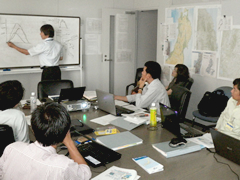 The Lecture Scene on River Management in Japan on July 20, 2011
The Lecture Scene on River Management in Japan on July 20, 2011
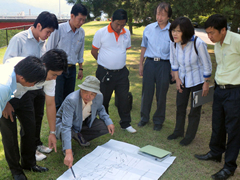 Trainees received on-site orientation on "Manriki Bayashi" (Flood Disaster Prevention Forest) in Fuefuki River (tributary of Fuji River) on July 22, 2011
Trainees received on-site orientation on "Manriki Bayashi" (Flood Disaster Prevention Forest) in Fuefuki River (tributary of Fuji River) on July 22, 2011
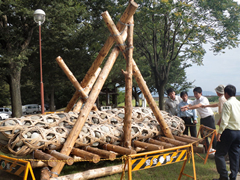 Trainees received on-site orientation on "Seigyu" (Skeleton Work) in Fuji River on July 22, 2011
Trainees received on-site orientation on "Seigyu" (Skeleton Work) in Fuji River on July 22, 2011
Note: Skeleton work called "Seigyu" in Japanese is a traditional river work in Japan. Skeleton work is a kind of permeable groyne which has the origin in Fuji River and used for many rapid streams in Japan.
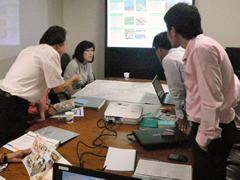 The Lecture Scene on River Management in Japan on July 25, 2011
The Lecture Scene on River Management in Japan on July 25, 2011
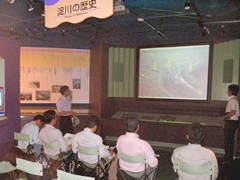 Trainees received an orientation on river management of Yodogawa Riverat Yodogawa Museum on July 26, 2011
Trainees received an orientation on river management of Yodogawa Riverat Yodogawa Museum on July 26, 2011
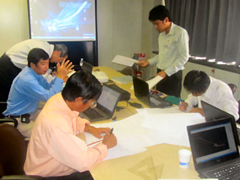 Practical Training on Design of Riverbank Protection Works on July 27, 2011
Practical Training on Design of Riverbank Protection Works on July 27, 2011
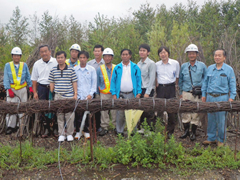 Trainees visited preparation yard for Soda method (Rensai Hurdle Work) in Niigata prefecture on July 28, 2011
Trainees visited preparation yard for Soda method (Rensai Hurdle Work) in Niigata prefecture on July 28, 2011
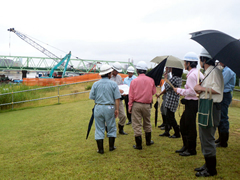 Trainees received on-site orientation on "Yasuragi Levee" (levee with very mild slope as a water amenity facility) in the downstream of Shinano River on July 29, 2011
Trainees received on-site orientation on "Yasuragi Levee" (levee with very mild slope as a water amenity facility) in the downstream of Shinano River on July 29, 2011
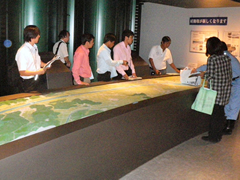 Trainees received an orientation on Ohkouzu Diversion Channel at Shinano River Ohkouzu Museum on July 29, 2011
Trainees received an orientation on Ohkouzu Diversion Channel at Shinano River Ohkouzu Museum on July 29, 2011
On the final day of the training course, presentation of action plan by each trainee and certificate hand-over ceremony were held on August 1, 2011. Most of the trainees continue the Project activities as C/P officials after their going back to Lao P.D.R. It is expected that they will utilize their knowledge and experience gained by this training course for their work and contribute to further development of Lao P.D.R. through mainly riverbank protection field.
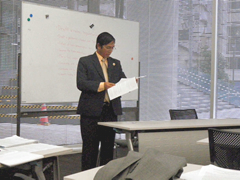 Each Trainee presented their action plan on August 1, 2011
Each Trainee presented their action plan on August 1, 2011
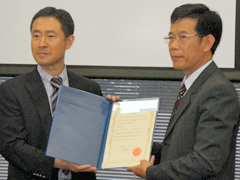 Certificate Hand-over Ceremony on August 1, 2011
Certificate Hand-over Ceremony on August 1, 2011
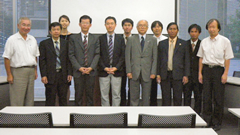 A Ceremonial Photograph after the Closing on August 1, 2011
A Ceremonial Photograph after the Closing on August 1, 2011
Finally, we'd like to express our deep gratitude to the River Bureau of the Ministry of Land, Infrastructure, Transport and Tourism (MLIT), Kinki Regional Development Bureau of MLIT, Hokuriku Regional Development Bureau of MLIT, Yamanashi Prefectural Disaster Prevention Center and Hokuriku Soda Business Promotion Association for their sincere cooperation to the implementation of this training course.
- About JICA
- News & Features
- Countries & Regions
- Our Work
- Thematic Issues
- Types of Assistance
- Partnerships with Other Development Partners
- Climate Change / Environmental and Social Considerations
- Evaluations
- Compliance and Anti-corruption
- Science and Technology Cooperation on Global Issues
- Research
- JICA Development Studies Program / JICA Chair
- Support for the Acceptance of Foreign HRs / Multicultural and Inclusive Community
- Publications
- Investor Relations
